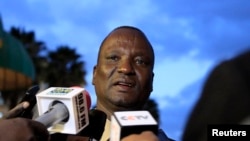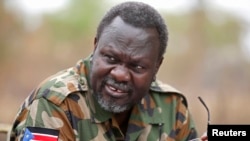JUBA —
Prosecution witnesses surprised the court when on Wednesday they tettified in favor of four South Sudanese political detainees accused of treason for their alleged role in the December uprising.
Under cross-examination, Army Brigadier General Atem Benjamin said he did not have any evidence to implicate the four men who are on trial in the attempt to topple the government of President Salva Kiir.
Benjamin had told the court, however, that he has evidence that former vice president Riek Machar led the uprising that started December 15 in a Juba military barracks. Machar, who has denied the accusation, went into hiding when the violence erupted.
The other witness, Major General Mach Paul Kuol, who is the director of military intelligence, accused former Unity state governor Taban Deng Gai of being involved in the plot.
Kuol said his accusation was based on the fact that Gai called him to ask why he had arrested a soldier who was caught in mid-December, trying to make copies of keys to an armory inside the Giada military barracks in Juba, where the fighting began.
Kuol said he found the phone call suspicious and informed his superiors.
But he also said he has no evidence that the four men on trial were involved in the alleged coup on Dec. 15.
Gai fled South Sudan when the fighting broke out and is the lead negotiator for the anti-government side at peace talks for South Sudan, being held in Addis Ababa. The government has said it has enough evidence to charge him and Machar with treason.
The two officers' testimonies contrasted with statements made to the court last week by Thomas Duoth, director general of external security, who said he had solid evidence that the four men on trial were part of a plan to seize power in a coup.
Lead prosecution attorney James Mayen said his team is trying to present a complete picture of what happened when the fighting erupted in Juba in December. Not every prosecution witness will present evidence against the accused, he said.
Mayen said he was satisfied with the way the prosecution's case was proceeding. The prosecution has called six witnesses so far and will call another six before the defense presents its case, he said.
Defense lawyer Monyluak Alor called Benjamin's and Kuol's testimonies a victory for his side, and a blow to the prosecution case, which he said "is getting weaker and weaker.”
The special court in Juba began hearing the case against former SPLM secretary general Pagan Amum Okiech, former security minister Oyay Deng Ajak, former deputy defense minister Majok D'Agot Atem, and the former envoy of the semi-autonomous South Sudan government to the United States, Ezekiel Lol Gatkuoth, earlier this month.
Under cross-examination, Army Brigadier General Atem Benjamin said he did not have any evidence to implicate the four men who are on trial in the attempt to topple the government of President Salva Kiir.
Benjamin had told the court, however, that he has evidence that former vice president Riek Machar led the uprising that started December 15 in a Juba military barracks. Machar, who has denied the accusation, went into hiding when the violence erupted.
The other witness, Major General Mach Paul Kuol, who is the director of military intelligence, accused former Unity state governor Taban Deng Gai of being involved in the plot.
Kuol said his accusation was based on the fact that Gai called him to ask why he had arrested a soldier who was caught in mid-December, trying to make copies of keys to an armory inside the Giada military barracks in Juba, where the fighting began.
Kuol said he found the phone call suspicious and informed his superiors.
But he also said he has no evidence that the four men on trial were involved in the alleged coup on Dec. 15.
Gai fled South Sudan when the fighting broke out and is the lead negotiator for the anti-government side at peace talks for South Sudan, being held in Addis Ababa. The government has said it has enough evidence to charge him and Machar with treason.
The two officers' testimonies contrasted with statements made to the court last week by Thomas Duoth, director general of external security, who said he had solid evidence that the four men on trial were part of a plan to seize power in a coup.
Lead prosecution attorney James Mayen said his team is trying to present a complete picture of what happened when the fighting erupted in Juba in December. Not every prosecution witness will present evidence against the accused, he said.
Mayen said he was satisfied with the way the prosecution's case was proceeding. The prosecution has called six witnesses so far and will call another six before the defense presents its case, he said.
Defense lawyer Monyluak Alor called Benjamin's and Kuol's testimonies a victory for his side, and a blow to the prosecution case, which he said "is getting weaker and weaker.”
The special court in Juba began hearing the case against former SPLM secretary general Pagan Amum Okiech, former security minister Oyay Deng Ajak, former deputy defense minister Majok D'Agot Atem, and the former envoy of the semi-autonomous South Sudan government to the United States, Ezekiel Lol Gatkuoth, earlier this month.






